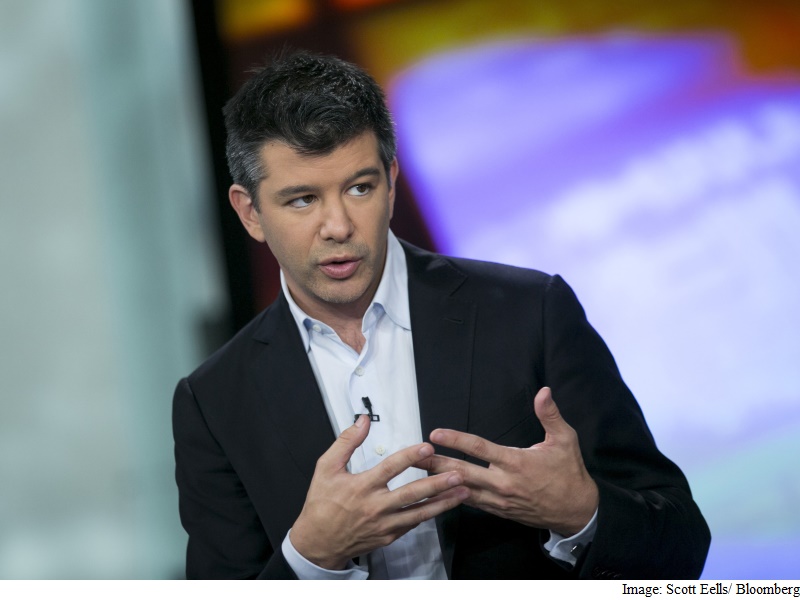- Home
- Apps
- Apps Features
- The 'Uber Commute' Is Next Frontier for CEO Kalanick
The 'Uber Commute' Is Next Frontier for CEO Kalanick

"We can turn every car into a shared car - the next frontier is the Uber commute," CEO Kalanick said Monday at a conference in Brussels. "Is there a way that someone could pick up a neighbor on the way to work? We have the technology for it, but there are also regulatory frameworks we have to work with. Why can't these folks get a little more incentive?"
Kalanick said he met with regulators at the European Commission earlier in the day to talk about how cities can solve problems like traffic, parking, and having too many cars on the roads.
"We're making our case but also learning what it's going to take to bring our kind of innovation to many cities here in Europe," Kalanick said at the conference, organized by think tank Lisbon Council. "I got my first course in speaking European this morning at the European Commission."
Thousands of people are car-pooling with UberPool in San Francisco and 19 cities in China, Kalanick said. "Imagine if the 300,000 Brussels citizens driving into work this morning could pick somebody up and make a small profit from doing it," Kalanick said. "More people would carpool, we'd have less congestion, the air would be less polluted, we'd all live in a better place. The city doesn't even have to use taxes to make it happen."
In China, Uber is seeking to catch up to local rival Didi Chuxing, which has launched in hundreds of cities and this month got $1 billion in backing from Apple Inc.
"China's an expensive place and it takes a lot of funds," Kalanick told reporters after the conference about Apple's investment. At the same time, "there's a lot of funding in this environment because there's so much progress on the other side."
Uber's profits can help fund its expansion into new markets and products, Kalanick said. When asked whether the company needs to go back to investors to raise more money, Kalanick said "We'll keep you posted on that."
China's Didi, already backed by Alibaba Group Holding and Tencent Holdings, is valued about $26 billion after the latest round of $3 billion, including Apple's contribution, people familiar have said. Uber has been valued at $62.5 billion and is the biggest ride-sharing app globally.
Uber's initiatives to expand into new services outside its traditional chauffeured-car business have faced steep regulatory hurdles in Europe. The company suspended its UberPop business, which lets unlicensed drivers use their own car to pick up riders for a cheaper fee, in Sweden this month amid legal challenges. The service had faced a similar fate in France and the Netherlands earlier.
While Uber has been dragged to court over UberPop, it has argued the service isn't illegal and has called on lawmakers to update the regulatory framework to adapt it to the chauffeured-car industry, which has expanded vastly beyond taxis.
Meanwhile local rivals including Spain's Cabify, backed by Rakuten Inc., and France's Chauffeur-Prive, backed by La Banque Postale's XAnge, are adding to existing pressure by taxis and other local players. They're catering to bankers, lawyers and corporate customers to stand out from Uber.
© 2016 Bloomberg L.P.
For the latest tech news and reviews, follow Gadgets 360 on X, Facebook, WhatsApp, Threads and Google News. For the latest videos on gadgets and tech, subscribe to our YouTube channel. If you want to know everything about top influencers, follow our in-house Who'sThat360 on Instagram and YouTube.
Related Stories
- Samsung Galaxy Unpacked 2025
- ChatGPT
- Redmi Note 14 Pro+
- iPhone 16
- Apple Vision Pro
- Oneplus 12
- OnePlus Nord CE 3 Lite 5G
- iPhone 13
- Xiaomi 14 Pro
- Oppo Find N3
- Tecno Spark Go (2023)
- Realme V30
- Best Phones Under 25000
- Samsung Galaxy S24 Series
- Cryptocurrency
- iQoo 12
- Samsung Galaxy S24 Ultra
- Giottus
- Samsung Galaxy Z Flip 5
- Apple 'Scary Fast'
- Housefull 5
- GoPro Hero 12 Black Review
- Invincible Season 2
- JioGlass
- HD Ready TV
- Laptop Under 50000
- Smartwatch Under 10000
- Latest Mobile Phones
- Compare Phones
- Moto G15 Power
- Moto G15
- Realme 14x 5G
- Poco M7 Pro 5G
- Poco C75 5G
- Vivo Y300 (China)
- HMD Arc
- Lava Blaze Duo 5G
- Asus Zenbook S 14
- MacBook Pro 16-inch (M4 Max, 2024)
- Honor Pad V9
- Tecno Megapad 11
- Redmi Watch 5
- Huawei Watch Ultimate Design
- Sony 65 Inches Ultra HD (4K) LED Smart TV (KD-65X74L)
- TCL 55 Inches Ultra HD (4K) LED Smart TV (55C61B)
- Sony PlayStation 5 Pro
- Sony PlayStation 5 Slim Digital Edition
- Blue Star 1.5 Ton 3 Star Inverter Split AC (IC318DNUHC)
- Blue Star 1.5 Ton 3 Star Inverter Split AC (IA318VKU)

















